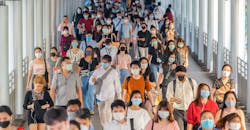It’s not too soon to begin asking ourselves if we’d make the same decisions again. Five months into an intentional recession, the U.S. gross domestic product has dropped -35.2% since the start of the 2Q 2020, and nationwide unemployment spiked from 3.5% in February to 14.7% in April. The unemployment figures slid back to 11.1% in June, suggesting the worst financial effects of the coronavirus pandemic may be behind us now – except for the uncertainty about the next phase of the outbreak, and the doubts about our ability to sustain continued losses and inactivity on such a scale.
Every basic economics course touches on the importance of “confidence” for maintaining economic stability: confidence, or trust, allows us to order supplies for a production program, or to hire workers to carry out a new contract. Trust allows banks to extend credit to potential buyers, and it makes it possible for the Federal Reserve Bank to issue currency to be used by everyone.
One might look back now on the decision by manufacturers, together with retailers, service businesses, and others, to suspend most activities for a month or more, and trace that to the uncertainty we now share.
But those were decisions based on trust — trust in government officials and health authorities to speak truthfully and to make proper decisions, and trust in ourselves and our colleagues to share the burdens of the sacrifices we accepted. Surely many people also acted in response to their fears of the alternative outcomes, but our decisions in March and April were affirmative choices drawing on confidence in our institutions, organizations, and associations. These were voluntary choices. We did not come to our present circumstances by force or by deception. We chose this outcome.
This responsibility may be difficult to accept, or even to recall, but it is an important point that must not be lost if we are to regain the assurance and dynamism we shared when the unemployment rate was 3.5%.
It’s understandable that some may disclaim responsibility now for the choice we made then, in particular because the problem now is different than the one we set out to fix in March and April. Now we live in reduced circumstances, financially of course, but also personally. We have lost some of the autonomy we claim as a birthright, some of the freedom to make individual choices about our lives and fortunes.
The economic cost of this is staggering. According to the New York Times, almost 66,000 U.S businesses have closed permanently since March 2020. Those are decisions made by individuals too, but now we see more clearly how such decisions alter the circumstances and future prospects for untold thousands of other individuals and organizations that have depended upon their association with the former enterprise — for employment, for purchases and supplies, as well as for tax revenues.
And the scope of such lost opportunities makes the future harder to predict. Manufacturers that have resumed operations now do so on a more limited basis: fewer individuals may occupy the workspace, more time must be allowed to complete orders because of new work rules, and new costs must be assumed to maintain additional cleaning prescriptions. More broadly, there has been a significant disruption to supply chains, meaning the arrangements and patterns that ensure the reliable sourcing of materials and parts, and the timely delivery of materials and parts to the operations that process or finish them into saleable products.
This is an extensive problem that is running parallel to the public health problem we all continue to acknowledge, and while the latter may be contained by adopting new precautions, the former is growing more acute day by day. We are restricting our abilities to solve our economic problem because of our determination to manage the public health problem. A separation is necessary.
Our understanding of all this is made more difficult now by the speed and range of ideas, a phenomenon long-ago labeled (unironically) “viral”. We are not helped now by the inconsistent priorities imposed by the governing and regulatory authorities in whom we placed confidence last spring – nor by the ambitions of those seeking to gain that authority. We are constricted now by a new zero-tolerance standard for risk, a standard that will continue to depress economic opportunity and innovation, the sort of innovation that historically has overcome problems that seemed intractable or impossible.
But the irresponsibility or unreliability of those in authority now is not, in the end, responsible for the two problems we face. We made these decisions voluntarily.
About the Author
Robert Brooks
Content Director
Robert Brooks has been a business-to-business reporter, writer, editor, and columnist for more than 20 years, specializing in the primary metal and basic manufacturing industries. His work has covered a wide range of topics, including process technology, resource development, material selection, product design, workforce development, and industrial market strategies, among others.
